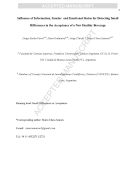Por favor, use este identificador para citar o enlazar este ítem:
https://repositorio.uca.edu.ar/handle/123456789/5458| Campo DC | Valor | Lengua/Idioma |
|---|---|---|
| dc.contributor.author | Rocha Parra, Diego F. | es |
| dc.contributor.author | Galmarini, Mara Virginia | es |
| dc.contributor.author | Chirife, Jorge | es |
| dc.contributor.author | Zamora, María Clara | es |
| dc.contributor.other | Universidad Católica Argentina (Buenos Aires). Facultad de Ciencias Agrarias | es |
| dc.contributor.other | Consejo Nacional de Investigaciones Científicas y Técnicas (Argentina) | es |
| dc.date.accessioned | 2019-06-06T00:48:22Z | - |
| dc.date.available | 2019-06-06T00:48:22Z | - |
| dc.date.issued | 2015 | - |
| dc.identifier.citation | Rocha Parra, D. Galmarini. M., Chirife, J. y M. C. Zamora. 2015. Influence of information, gender and emotional status for detecting small differences in the acceptance of a new healthy beverage [en línea]. Postprint del artículo publicado en Food Research International. 76(2). doi:10.1016/j.foodres.2014.12.021 Disponible en: https://repositorio.uca.edu.ar/handle/123456789/5458 | es |
| dc.identifier.uri | https://repositorio.uca.edu.ar/handle/123456789/5458 | - |
| dc.description.abstract | Abstract: Moderate wine consumption has been recommended as a health benefits practice, although alcohol content is sometimes the main factor for rejecting its consumption. This study focuses on the development of a fruit flavored powder beverage, having the same polyphenols of wine but without the alcohol content. The specific aim of the present work was to evaluate if the factors gender and information regarding health benefits could have some influence on consumer decisions while evaluating preference of samples with small formulation differences. In addition, emotional status and comments about likes and dislikes of the beverages were also investigated. For this purpose, one hundred and forty-four consumers (70 females and 74 males; aged 19 to 35 years old, M = 23.3, SD = 4.0) gave their degree of acceptance for four beverages. Each drink contained different levels of a powder concentrate of red wine (35 and 40 g/L) and sweetener (4 and 5 g/L). The participants estimated first by a 9-point category scale and, then by Visual Analogue Scales (VAS) the following attributes: acceptance, appearance, aroma, sweetness, flavor, acidity and astringency. Having two scales allowed the study to double check consumer evaluations. Results showed that the acceptance scores among formulations only showed significant differences with the 9-point category scale. The cross study presented the highest divergences by gender factor. Males gave similar or higher values when confirming the evaluation using the second scale. Conversely, females gave similar or lower values in the same conditions. Thus, the double scale strategy highlighted the differences of the target population. Even though information of health benefits did not increase the acceptance of the new beverage, it had a different impact between males and females. The emotions chosen by the consumers to describe their feelings about the new beverage helped to explain the acceptance data | es |
| dc.format | application/pdf | es |
| dc.language.iso | eng | es |
| dc.rights | Acceso Abierto | es |
| dc.rights.uri | https://creativecommons.org/licenses/by-nc-sa/4.0/ | es |
| dc.source | Postprint del artículo publicado en Food Research International. 76(2), 2015 | es |
| dc.subject | EMOCIONES | es |
| dc.subject | SALUD | es |
| dc.subject | CONSUMIDORES | es |
| dc.subject | ALCOHOL | es |
| dc.subject | VINO | es |
| dc.subject | BEBIDAS EN POLVO | es |
| dc.title | Influence of information, gender and emotional status for detecting small differences in the acceptance of a new healthy beverage | es |
| dc.type | Artículo | es |
| uca.path | Facultad de Ingeniería y Ciencias Agrarias|Artículos | es |
| uca.disciplina | INGENIERIA EN ALIMENTOS | es |
| uca.filename | /home/data-uca-generic/folder_generic_common/Ing. y Cs.Agrarias/Art�culos/influence-information-gender-emotional/metadata.xml | es |
| uca.issnrd | 1 | es |
| uca.affiliation | Fil: Rocha Parra, Diego F. Pontificia Universidad Católica Argentina. Facultad de Ciencias Agrarias; Argentina | es |
| uca.affiliation | Fil: Rocha Parra, Diego F. Consejo Nacional de Investigaciones Científicas y Técnicas; Argentina | es |
| uca.affiliation | Fil: Galmarini, Mara Virginia. Pontificia Universidad Católica Argentina. Facultad de Ciencias Agrarias; Argentina | es |
| uca.affiliation | Fil: Galmarini, Mara Virginia. Consejo Nacional de Investigaciones Científicas y Técnicas; Argentina | es |
| uca.affiliation | Fil: Chirife, Jorge. Pontificia Universidad Católica Argentina. Facultad de Ciencias Agrarias; Argentina | es |
| uca.affiliation | Fil: Zamora, María Clara. Pontificia Universidad Católica Argentina. Facultad de Ciencias Agrarias; Argentina | es |
| uca.affiliation | Fil: Zamora, María Clara. Consejo Nacional de Investigaciones Científicas y Técnicas; Argentina | es |
| local.message.claim | 2019-06-06T18:26:26.026-0300|||null|||submit_approve|||dc_contributor_author|||jsp.dspace.authority-listclaim.default.note | * |
| uca.version | publishedVersion | es |
| item.languageiso639-1 | en | - |
| item.fulltext | With Fulltext | - |
| item.grantfulltext | open | - |
| crisitem.author.dept | Facultad de Ingeniería y Ciencias Agrarias | - |
| crisitem.author.dept | Facultad de Ingeniería y Ciencias Agrarias | - |
| crisitem.author.dept | Laboratorio de Ingeniería en Alimentos | - |
| crisitem.author.dept | Facultad de Ingeniería y Ciencias Agrarias | - |
| crisitem.author.orcid | 0000-0002-2900-4529 | - |
| crisitem.author.parentorg | Pontificia Universidad Católica Argentina | - |
| crisitem.author.parentorg | Pontificia Universidad Católica Argentina | - |
| crisitem.author.parentorg | Facultad de Ingeniería y Ciencias Agrarias | - |
| crisitem.author.parentorg | Pontificia Universidad Católica Argentina | - |
| Aparece en las colecciones: | Artículos | |
Ficheros en este ítem:
| Fichero | Descripción | Tamaño | Formato | |
|---|---|---|---|---|
| influence-information-gender-emotional.pdf | 307,72 kB | Adobe PDF |  Visualizar/Abrir |
Visualizaciones de página(s)
156
comprobado en 30-abr-2024
Descarga(s)
188
comprobado en 30-abr-2024
Google ScholarTM
Ver en Google Scholar
Este ítem está sujeto a una Licencia Creative Commons

